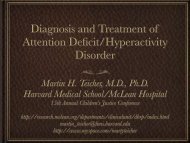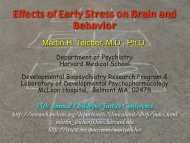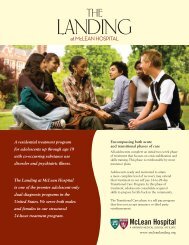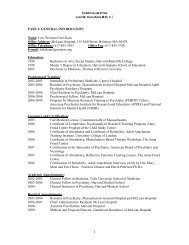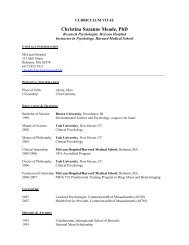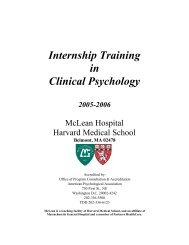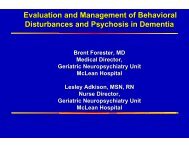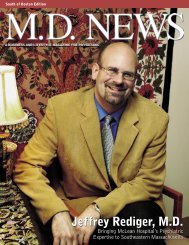MCL-014 Newsletter - McLean Hospital - Harvard University
MCL-014 Newsletter - McLean Hospital - Harvard University
MCL-014 Newsletter - McLean Hospital - Harvard University
Create successful ePaper yourself
Turn your PDF publications into a flip-book with our unique Google optimized e-Paper software.
T H E I R E N E P I E R C E S T I V E R<br />
Issue 004 • Spring 2008<br />
P SYCHOLOGY A LUMNI A SSOCIATION N EWS<br />
A T M C L E A N H O S P I T A L<br />
Drs. Jaffee (left) and Youngberg<br />
IN THIS ISSUE:<br />
Authors Corner:<br />
Helping Your Troubled Teen<br />
Adolescent DBT Program<br />
Opens in East House<br />
Bringing Psychiatry<br />
to the Battlefield<br />
GREETINGS TO OUR FELLOW <strong>MCL</strong>EAN ALUMNI:<br />
Change is in the air and on the grounds at <strong>McLean</strong> <strong>Hospital</strong> as it positions itself for a third century of excellence in<br />
psychiatric clinical care, education and research. A strategic planning process, initiated in September 2007, is well<br />
under way and is anticipated to be concluded this summer. The process is being spearheaded by <strong>McLean</strong> President<br />
and Psychiatrist in Chief Scott Rauch, MD, and a 10-member group of hospital trustees, senior administrators and<br />
representatives from Partners HealthCare. Though the hospital is faring well financially, Dr. Rauch has said that a<br />
strategic plan will help <strong>McLean</strong> define and achieve long-term goals aimed at making the hospital “even stronger, more<br />
prosperous and well-suited to carry out our mission.”<br />
The process was designed to afford a variety of opportunities for people to provide input and there continues to be<br />
multiple vehicles for members of the <strong>McLean</strong> community to do so. Philip Levendusky, PhD, ABPP, director of<br />
Psychology and Psychology Training and senior vice president for Marketing and Business Development, and<br />
Edmund Neuhaus, PhD, ABPP, co-director of Psychology Training, are leading critical task forces that are charged with<br />
closely examining the many facets of hospital operations. Dr. Levendusky’s task force will address and ultimately make<br />
recommendations on ways to maximize opportunities in business development and marketing, while Dr. Neuhaus’ task<br />
force will work on crafting strategies to enhance the care model.<br />
Strategic planning is a proactive process that we can feel good about as it will position <strong>McLean</strong> as an international<br />
leader in advancing psychiatry well into the 21st century. If you would like to keep updated on the planning process,<br />
please contact Cindy Lepore, director of Communications for <strong>McLean</strong>, at 617.855.2110 or leporec@mclean.harvard.edu.<br />
She will add you to the weekly distribution of <strong>McLean</strong> News, which is reporting regularly on all aspects of this process.<br />
In other news, it is with great enthusiasm that we announce the kickoff of the Alumni Tree Fund, a giving opportunity<br />
that will enable members of both the psychology and psychiatry alumni training associations to express their gratitude<br />
for their years of training at <strong>McLean</strong>. Turn to page 2 for details on this and another philanthropic endeavor by<br />
psychology interns in the Class of 2007.<br />
Finally the <strong>McLean</strong> social, held at the 41st Annual ABCT Convention (Association for the Advancement of Behavioral<br />
and Cognitive Therapies) in Philadelphia in November 2007, was well attended by alumni, friends and hopeful intern<br />
applicants. Dr. Neuhaus and other training faculty were on hand to update alumni on recent <strong>McLean</strong> happenings and<br />
catch up on developments in graduates’ personal and professional lives. We hope to see you at the <strong>McLean</strong> reception<br />
this November, during the 2008 convention in Orlando.<br />
Robert L. Youngberg, PhD<br />
William Jaffee, PhD<br />
Class of 1994 Class of 2004<br />
Co-Chair<br />
Co-Chair<br />
Psychology Alumni Association<br />
Psychology Alumni Association<br />
www.mclean.harvard.edu<br />
Ranked first among the nation’s freestanding psychiatric hospitals…U.S. News & World Report
ALUMNI TREE FUND IS BUDDING<br />
Robert Youngberg, PhD, Class of 1994 • ryoungberg@verizon.net<br />
Since 1895 when <strong>McLean</strong> selected its site<br />
perched atop Belmont Hill, the hospital has<br />
prided itself on its landscape design and the<br />
hundreds of trees that define its campus. Next<br />
year, the <strong>McLean</strong> psychology and residency<br />
alumni associations will add to that beauty with<br />
the gifting of two Colorado blue spruce trees. The<br />
spruces, which are depicted on the hospital’s<br />
logo, will serve as a living, growing physical<br />
representation of the hospital and its ongoing<br />
mission of excellence in training, research and<br />
patient care.<br />
The gift will be made by former interns and<br />
residents in appreciation of the outstanding<br />
training experience they received in their years at<br />
<strong>McLean</strong>. Each alumni association will donate a<br />
single tree. An accompanying plaque will be placed at the base of each tree with an<br />
inscription. In addition, a representation of the <strong>McLean</strong> logo will be displayed in front of the<br />
trees with an explanation of what the trees are intended to symbolize. Solar-powered flood<br />
lighting will also be gifted to provide night-time views.<br />
The trees will most likely be planted at the corner of Bowditch Hall facing the<br />
Admissions Building. This area, with alumni-gifted benches (see related story below)<br />
and freshly planted flowers, will become a pleasant location for small groups of the<br />
<strong>McLean</strong> community to enjoy. To donate to the Alumni Tree Fund, please contact Cecelia<br />
O’Neal, MSc, operations director, Marketing and Business Development, at 617.855.2840<br />
or e-mail psychologyalumni@mclean.harvard.edu.<br />
CLASS OF 2007 WILL<br />
LEAVE LASTING LEGACY<br />
Robert Youngberg, PhD, Class of 1994 • ryoungberg@verizon.net<br />
The Alumni Association extends its sincere appreciation to the internship Class of 2007 for<br />
its very generous donation to the Alumni Tree Fund. In the same way the interns envision<br />
their training experience will have a lasting impact on their professional lives, the class hopes<br />
to have an enduring influence on its training alma mater.<br />
To fulfill this objective, the interns have donated funds for a wooden bench to be placed in<br />
front of the alumni trees, once they are planted, for the entire <strong>McLean</strong> community to enjoy.<br />
The interns have also contributed toward the creation of a perennial flower garden adjacent<br />
to the Recreation Building.<br />
The bench inscription will read:<br />
In honor of<br />
Philip Levendusky, PhD, Edmund Neuhaus, PhD, and Gary Taylor, PhD.<br />
With thanks for your devotion to psychology training at <strong>McLean</strong> <strong>Hospital</strong>.<br />
Intern Class of 2006-2007<br />
AUTHOR’S CORNER<br />
“HELPING YOUR TROUBLED TEEN.<br />
LEARN TO RECOGNIZE, UNDERSTAND<br />
AND ADDRESS THE DESTRUCTIVE<br />
BEHAVIOR OF TODAY’S TEENS”<br />
Cynthia Kaplan, PhD, administrative director of <strong>McLean</strong>’s Child<br />
and Adolescent Program • kaplanc@mcleanpo.mclean.org<br />
Destructive trends among today’s youth are growing,<br />
making life very different from when their parents were<br />
growing up. The four primary self-destructive behaviors in<br />
adolescence today fall under the categories of excessive<br />
alcohol and substance abuse, promiscuity, self-injury and<br />
eating disorders. These topics, along with other prevalent<br />
concerns, such as Internet addictions, depression and<br />
suicide, are covered by Dr. Kaplan in “Helping Your Troubled<br />
Teen,” co-authored by <strong>McLean</strong> <strong>Hospital</strong> child and adolescent<br />
psychiatrists Blaise Aguirre, MD, and Michael Rater, MD.<br />
The book focuses not only on the detriment that patterns of<br />
destructive teen behavior have on teens’ personal mental and<br />
physical health; it also touches<br />
upon the potential legal,<br />
academic and family pressures<br />
and problems that result from<br />
harmful teen behavior. The book<br />
emphasizes identification and<br />
targeted prevention as the<br />
most important avenues toward<br />
avoiding teenage selfdestructive<br />
behavior.<br />
“Helping Your Troubled Teen”<br />
provides parents with instruction on how to identify at-risk<br />
adolescents and offers guidelines for seeking appropriate<br />
care. It details many of the warning signs of injurious behavior<br />
that commonly occur before a child is in psychological crisis.<br />
It also highlights personal anecdotes and testimonials from<br />
parents and teenagers who have either confronted or<br />
engaged in self-destructive behavior.<br />
READER REVIEWS:<br />
“A superb and extremely helpful book for parents.”<br />
Edward M. Hallowell, MD, author of “Driven to Distraction:<br />
Recognizing and Coping with Attention Deficit Disorder from<br />
Childhood through Adulthood”<br />
“The authors are experienced, skilled clinicians who work<br />
with many youths who display problematic behaviors. What<br />
they have learned … is evident on every page of this<br />
remarkable book.”<br />
Robert Brooks, PhD, co-author of “Raising Resilient Children”<br />
2 ALUMNI NEWS
<strong>MCL</strong>EAN LAUNCHES ADOLESCENT DBT PROGRAM<br />
In September 2007, <strong>McLean</strong> <strong>Hospital</strong> opened an<br />
adolescent residential treatment program in newly<br />
renovated space in East House. The eight-bed<br />
residence, named 3East, places heavy emphasis on the<br />
use of dialectical behavior therapy (DBT) and is<br />
designed for young women, ages 13 to 19, who are<br />
exhibiting self-endangering behaviors and emerging<br />
borderline personality traits.<br />
Blaise Aguirre, MD, the center’s medical director, is a<br />
child and adolescent psychiatrist widely recognized for<br />
his work in the treatment of borderline personality<br />
disorder (BPD) and other complex adolescent<br />
psychiatric disorders. He and clinical staff members are<br />
specially trained in DBT interventions—techniques<br />
proven highly effective in treating patients displaying<br />
chronically self-destructive behavior, suicidality and<br />
other challenging biosocial behaviors, such as eating<br />
disorders. Unit staff includes Michael Hollander, PhD,<br />
head of the DBT Consultation Team and one of the few<br />
DBT trainers nationwide, who is also an expert on<br />
self-injurious behavior in children and adolescents.<br />
“This program is designed to immerse the adolescent in<br />
treatment. The strong clinical alliance allows clinicians,<br />
adolescents and families to determine the most<br />
effective way to achieve their treatment goals,”<br />
said Aguirre.<br />
The program, because it is self-funded, affords patients<br />
the time they need to prepare themselves for the road<br />
beyond <strong>McLean</strong> to recovery. “With insurance-funded<br />
programs, some adolescents are discharged<br />
prematurely before they, their family and their<br />
caretakers have had the full opportunity to learn the<br />
skills and strategies necessary to achieve progress.<br />
In our program, the length of stay is a minimum<br />
of four weeks and ideally, a maximum of six weeks,”<br />
said Aguirre.<br />
Treatment components include individual DBT therapy,<br />
group skills-based therapy, individual skills coaching<br />
and family therapy, which emphasizes parental skills<br />
development. Additional treatment components<br />
consist of case management, psychopharmacology<br />
evaluation and treatment, milieu and recreational<br />
therapies, as well as tutoring and academic<br />
programming if necessary.<br />
Upon entering the program, patients are initially seen by<br />
a multidisciplinary team of clinicians, led by Aguirre.<br />
Specialty consultations are available as needed in the<br />
areas of eating disorders, neurology, trauma, attention<br />
deficit disorder and other child and adolescent<br />
psychiatric disorders. Following the initial evaluation,<br />
the clinical team assesses all aspects of the<br />
adolescent’s care and develops a comprehensive,<br />
individualized treatment plan.<br />
DBT treatment was initially developed to treat<br />
suicidality associated with BPD in adults. “However, it<br />
has proven to have additional benefits for adolescents<br />
as well as for a variety of diagnoses,” said Aguirre.<br />
“While by nature, the personality of adolescents is still<br />
developing, the diagnosis of BPD can be made with<br />
great care and on the basis of a thorough history and<br />
evaluation of the adolescent’s thinking style, emotional<br />
coping patterns and interpersonal mode of functioning.<br />
It can be diagnosed in adolescents when symptoms are<br />
persistent and pervasive beyond a year’s time,” he<br />
added.<br />
For more information about the program, please call<br />
Dr. Aguirre at 617.855.3331 or e-mail him at<br />
baguirre@partners.org.<br />
Blaise Aguirre, MD<br />
PATIENT PROFILE<br />
Females, age 13 to 19, who would benefit from the program are those who:<br />
* suffer from emerging personality disorders with co-occurring psychiatric conditions, such as severe depression and anxiety;<br />
* demonstrate self-harm and substance abuse behaviors, rendering outpatient treatment unsafe and inadequate;<br />
* require a full psychiatric evaluation for precise diagnosis;<br />
* require a more intensive, individually crafted rehabilitation plan;<br />
* would benefit from long-term dialectical behavior therapy and skill development geared toward self-regulation.<br />
ALUMNI NEWS 3
SCHIZOPHRENIA-RELATED TRAITS<br />
OFFER KEY CLUES INTO ILLNESS<br />
Deborah L. Levy, PhD, Class of 1976 • dlevy@mclean.harvard.edu<br />
Deborah L. Levy, PhD<br />
The Psychology Research Laboratory at <strong>McLean</strong><br />
<strong>Hospital</strong>, long recognized as one of the premier<br />
schizophrenia research laboratories in the world, was<br />
founded and directed by the late Philip S. Holzman, PhD.<br />
As his longtime collaborator and co-director, it is my<br />
privilege to continue this work as we pursue our 20-year<br />
mission to identify genes associated with risk for<br />
schizophrenia. Today, rather than focusing exclusively<br />
on the disease in patients and relatives, the laboratory<br />
has developed innovative ways to identify well relatives<br />
who may be carriers of one or more of these<br />
susceptibility genes. This strategy is part of a novel<br />
approach that holds great promise for developing more<br />
targeted treatments, methods of early identification and<br />
hopefully, a cure.<br />
Schizophrenia, the most devastating of all chronic<br />
psychiatric illnesses, affects about 0.65 percent of the<br />
population and has far-reaching psychosocial and<br />
economic consequences for patients, their families and<br />
society. Identifying the genetic component of<br />
schizophrenia is complicated for three reasons: First,<br />
multiple genes are involved. Second, there is not an<br />
identifiable pattern of transmission in families. Third,<br />
only about 7 percent of immediate relatives have the<br />
same illness; usually neither parent is ill. The net result<br />
is that it is not possible to reliably distinguish gene<br />
carriers from non-gene carriers.<br />
To find genes for a complex disease like<br />
schizophrenia, we must improve detection of gene<br />
carriers. Some gene carriers are easy to identify<br />
because they have the illness. However, the vast<br />
majority of relatives do not have the illness. The key<br />
challenge is to distinguish well relatives who are gene<br />
carriers from well relatives who are not gene carriers.<br />
For unknown reasons, some parents and siblings<br />
seem to have the gene(s), but do not usually express<br />
them as schizophrenia. These genes, however, may be<br />
expressed in other, much less disabling ways, referred<br />
to as “schizophrenia-related” traits.<br />
The Psychology Research Laboratory at <strong>McLean</strong> has<br />
identified four schizophrenia-related traits. Each trait<br />
occurs in a large proportion of patients. Each trait also<br />
occurs in relatives at a much higher rate than<br />
schizophrenia. These traits can provide important<br />
insights into how genes for psychosis may be expressed<br />
in families. They include:<br />
• mild forms of the same thinking disturbance found in<br />
patients (i.e., using real words in unusual ways; for<br />
example, “Those are posterior pronunciations.”);<br />
• difficulty following a slowly moving target with one’s<br />
eyes;<br />
• evoked response potential (ERP) abnormalities (i.e.,<br />
reduced inhibition of the P50 response); and<br />
• a subtle deviation affecting the midline of the face<br />
that is mirrored along the midline of the brain.<br />
With the exception of the ERP anomaly, all of the<br />
schizophrenia-related traits were discovered in<br />
<strong>McLean</strong>’s Psychology Research Laboratory.<br />
This strategy is part of a novel<br />
approach that holds great promise for<br />
developing more targeted treatments.<br />
If schizophrenia is the rare manifestation of these<br />
susceptibility genes and the more benign schizophreniarelated<br />
traits are the more common expressions, it will<br />
be easier to detect schizophrenia genes through their<br />
effects on these other traits than through<br />
schizophrenia itself.<br />
The Psychology Research Laboratory collaborates with<br />
six other laboratories on studies that target specific<br />
genome regions, genomewide scans and copy-number<br />
variation to identify genes associated with the disease<br />
and one or more of the schizophrenia-related traits in<br />
families. The laboratory has received sustained funding<br />
from the National Institute of Mental Health for 30 years.<br />
Discovering genes that contribute to susceptibility for<br />
schizophrenia is the essential first step in enabling<br />
scientists to understand the biology that these genes<br />
express, which, in turn, is essential for developing truly<br />
effective interventions.<br />
4 ALUMNI NEWS
A FIRST-HAND ACCOUNT: BRINGING<br />
MENTAL HEALTH CARE TO THE BATTLEFIELD<br />
John Rodolico, PhD, Class of 1986 • rodolico@mclean.org<br />
Editors’ note: John Rodolico,<br />
PhD, an associate<br />
psychologist in <strong>McLean</strong>’s<br />
Adolescent Acute Residential<br />
Treatment Program, Alcohol<br />
and Drug Abuse Treatment<br />
Program and Behavioral Psychopharmacology Research Laboratory,<br />
has completed two tours of duty in Iraq since 2003. As a member of the<br />
United States Army Reserve, Rodolico was part of an overall military<br />
effort that has succeeded in providing much-needed mental health<br />
care to soldiers and Marines serving directly on the front lines of battle.<br />
For this effort, he was awarded two Bronze Star Medals for<br />
exceptional meritorious achievement. Here is Rodolico’s first-person<br />
account, lending his perspective and experiences.<br />
As the war in Iraq continues, the delivery of mental health care to military<br />
personnel remains a critical issue. As the executive officer (XO) of a<br />
combat stress control (CSC) medical company that has been deployed twice<br />
since the beginning of the war, I have witnessed how the delivery of mental<br />
health care has evolved. A traditional CSC company is comprised of 12 mobile<br />
mental health teams of two mental health officers and two to six mental<br />
health techs who are enlisted personnel. All personnel on these teams are<br />
trained combat medics and provide front-line medical care to wounded<br />
soldiers. These teams are traditionally located behind the forward edge of the<br />
battlefield, providing respite, mental health briefings and consultation to<br />
infantry commanders and their soldiers.<br />
Upon arriving in Kuwait in early February 2003, our CSC mission was to fall<br />
into the traditional model and as an XO, it was my job to make sure we<br />
followed that procedure. When the Iraq War began, we thought that our<br />
model would be a good fit for what the combat arms’ divisions were<br />
achieving. Shortly after the invasion of Baghdad and Mosul, we realized that<br />
our troops were beginning to settle into large forward operating bases and<br />
needed more traditional mental health care. This occurred because as the<br />
conflict shifted from a combat operation to an occupation mission, soldiers<br />
had more time on their hands to reflect on what had happened during the<br />
march forward. For some military members, this brought on symptoms of<br />
acute stress along with insomnia and depression. At this point, the CSC units<br />
began to erect mini mental health clinics, making them a stationary nonmobile<br />
medical asset. This medical footprint began in 2004 and was carried<br />
into late 2005, when the general public might recall the cry for additional<br />
mental health services.<br />
At this same time, my CSC company was preparing to deploy for a second<br />
time to the Sunni Triangle and was assigned the mission of providing mental<br />
health care to as many soldiers and Marines as possible. Upon examining the<br />
situation, we realized that only half of the forces in our area were receiving<br />
treatment. The soldiers who were receiving the least amount of care were<br />
those in the most remote areas of “The Triangle.” Ironically, these were the<br />
ones who needed it most. It was then, in conjunction with our higher<br />
command, that we set out to direct health care to remote outposts, which<br />
meant putting more men and women in harms way.<br />
Frankly, the plan to expand mental health services in high-risk areas<br />
emanated less so from our command and more so from the brave men and<br />
woman with whom I served. It was the combat medics who offered to place<br />
their lives on the line to help their brothers and sisters in combat. These and<br />
countless other selfless acts that I witnessed during this particular tour of<br />
duty showed me what real bravery and courage were about. Within two<br />
months, we doubled the number of clinics from seven to 14. We also were<br />
able to spider out from these mental health clinics to provide one-on-one care<br />
to soldiers in very remote outposts. It was not unusual for one of our techs to<br />
be seen with a scout group in the desert of western Iraq.<br />
I am proud to report that we served thousands of soldiers from 2005 to late<br />
2006 in 32 locations. As our presence became known, we were able to<br />
decrease the stigma attached to mental health care and the 21st century<br />
soldier. While these barriers to mental health are still being fought, they are<br />
becoming more permeable.<br />
As military psychologists, our mission does not end when we return home.<br />
We are often called on to provide mental health assessment and consultation<br />
for other returning soldiers. The majority of this treatment is being passed on<br />
to VA hospitals, garrison base psychologists and private practitioners; though<br />
some military members are treated at private hospitals, like <strong>McLean</strong>. For<br />
many of these soldiers, the ability to reintegrate into civilian life is more<br />
difficult than being in a war zone. We all have heard the stories of veterans<br />
trying to put the sounds, smells and chaos of war behind them. Unfortunately,<br />
these soldiers are not receiving the mental health care they so desperately<br />
need. Thankfully, through the military’s Behavioral Health Department,<br />
innovative programs are being piloted to help soldiers reintegrate back<br />
to civilian life.<br />
ALUMNI NEWS 5
PSYCHOLOGY ALUMNI CLASS NOTES<br />
William B. Jaffee, PhD , Class of 2004 • wjaffee@mclean.harvard.edu<br />
1973<br />
Joan Berger, PhD, is a training and supervising<br />
analyst at the Dallas Psychoanalytic Center and<br />
director of the Postgraduate Psychoanalytic<br />
Psychotherapy Program. The latter is a<br />
collaborative program involving several<br />
psychoanalytic entities in the Dallas<br />
community, including the Dallas Psychoanalytic<br />
Center, Dallas Society for Psychoanalytic<br />
Psychology, Dallas Society for Psychoanalytic<br />
Social Work and <strong>University</strong> of Texas<br />
Southwestern Medical Center Department of<br />
Psychology. Having completed a two-year adult<br />
program and a one-year child and adolescent<br />
program, the collaboration is offering an<br />
updated two-year adult program.<br />
Multidisciplinary collaboration and networking<br />
is promoted through co-teaching and sharing of<br />
perspectives in class. joanberger@gmail.com<br />
1978<br />
Baird Brightman, PhD, writes: “Over the past 10<br />
years I have been most interested in two<br />
questions: How do people achieve a high level<br />
of satisfaction and success at work and why do<br />
people and organizations so often disappoint<br />
each other? My work involves helping people<br />
to answer these questions and develop<br />
strategies for success. Please visit my website<br />
at www.wklf.com and feel free to contact me at<br />
bkb@wklf.com. I hope this finds you all well<br />
and thriving.”<br />
1980<br />
Joel A. Dvoskin, PhD, ABPP, is a diplomate in<br />
forensic psychology at the <strong>University</strong> of Arizona<br />
College of Medicine. He also just finished his<br />
year as president of the American Psychology<br />
Law Society, Division 41, of the American<br />
Psychological Association. joelthed@aol.com<br />
1982<br />
Peter Z. Mitchell, PhD, tells us: “After <strong>McLean</strong>,<br />
I ended up in the ‘right place at the right time’<br />
by landing a part-time consulting job in the field<br />
of quality assurance. I was eventually awarded<br />
a contract to conduct such work in New York<br />
state psychiatric facilities. My firm, BOCA, has<br />
been in business continuously since 1984.<br />
Because QA involves mostly chart reviews, it<br />
carries no licensing requirement. As the years<br />
passed, I procrastinated about obtaining the<br />
supervised experience needed in New York<br />
and was unable to take the licensing exam.<br />
Though successful as a consultant, my lack of<br />
a license gnawed away at me. Finally, several<br />
years ago, I communicated about this with Phil<br />
Levendusky and he encouraged me to apply for<br />
the exam anyway. To my surprise, the licensing<br />
board approved my application. After studying<br />
obsessively for six months, I passed the exam<br />
last October, probably making me one of the<br />
oldest people to obtain a license. It has<br />
certainly brought a positive feeling of closure to<br />
my ‘student’ days.” zpmboca@aol.com<br />
1989<br />
Paul Duberstein, PhD, left Boston for<br />
Rochester, NY, in 1990. He planned to return to<br />
Boston by 1995. It hasn’t happened (yet).<br />
Duberstein is professor of psychiatry at the<br />
<strong>University</strong> of Rochester, where he co-directs<br />
the Center for the Study and Prevention of<br />
Suicide and is a core faculty member at the<br />
Center for Mind-Body Research. He recently<br />
received an educational grant that aims to<br />
enhance the racial diversity of researchers<br />
committed to academic careers in mental<br />
health. He welcomes e-mails from “<strong>McLean</strong>ites”<br />
and from scholars wishing to pursue<br />
research training in suicide, late-life<br />
depression, personality, aging and health, or<br />
race and poverty-related health disparities.<br />
Paul_Duberstein@urmc.rochester.edu<br />
Lynn Margolies, PhD, reports: “I have been in a<br />
busy full-time private practice in Newton,<br />
Mass., working with a mostly highly educated<br />
and ‘successful’ population of adults, families,<br />
couples and adolescents. My niche for the past<br />
few years has been working with adolescents<br />
as well as men in their 20s to 40s, including a<br />
men’s group for social anxiety and/or<br />
relationship issues. I still do trauma work but<br />
not generally with a hospital population. I have<br />
also done some work in the media, including<br />
television commentary and writing for<br />
newspapers and magazines, which has been<br />
fun and interesting. I would love to hear from<br />
any fellow interns. Where are you, Paul<br />
Duberstein?” margoliesphd@aol.com<br />
1991<br />
Sharon Stein McNamara, EdD, a cognitive<br />
behavioral intern has news: Her twin boys, now<br />
age 7, are in second grade. She is in private<br />
practice in Shoreview, Minn., and has<br />
expanded her practice to include work with<br />
divorcing or post-decree couples, and uses a<br />
variation of dialectical behavior therapy to help<br />
couples come to agreements and make<br />
contracts in the best interests of co-parenting<br />
their children. Sharon also teaches as an<br />
adjunct faculty member at the Minnesota<br />
School of Professional Psychology as part of<br />
Argosy <strong>University</strong>, Twin Cities. She is collecting<br />
stories of psychologists and mental health<br />
professionals who have done their own<br />
psychological growth and healing for a book on<br />
wounded-healer stories. If you would like to<br />
contribute to her qualitative research, you may<br />
contact her at ssmcnamara@comcast.net.<br />
1994<br />
Daniel E. Shapiro, PhD, notes: “I’m now an<br />
associate professor at the <strong>University</strong> of Arizona<br />
College of Medicine, where I direct a medical<br />
humanities program and spend most of my time<br />
teaching medical students and psychiatry<br />
residents. I’ve written a few memoirs published<br />
by Random House and recently created a<br />
program in which medical students film the<br />
lives of patients with chronic illnesses. I love<br />
the high Sonoran Desert in Tucson but when<br />
autumn hits, I miss Belmont and the annual<br />
burst into color.” shapiro@email.arizona.edu<br />
1996<br />
Bettina Kanitz, EdD, writes: “After completing<br />
my training year at <strong>McLean</strong> <strong>Hospital</strong>, I worked<br />
for six months toward my post-doctoral hours<br />
at the Somerville Adolescent Program. I<br />
decided to relocate to Alexandria, Va.,<br />
following this and subsequently held several<br />
jobs, including being a staff psychologist at the<br />
Catholic <strong>University</strong> of America Catholic Center<br />
and an adjunct faculty member in psychology<br />
at George Mason <strong>University</strong>. Following my work<br />
at Catholic <strong>University</strong> (a temporary assignment<br />
only), I worked at the Center for Posttraumatic<br />
and Dissociative Disorders in the Psychiatric<br />
Institute of Washington. Given that this was not<br />
my ideal long-term career fit, I then worked as<br />
a clinical researcher at Johns Hopkins<br />
<strong>University</strong> School of Medicine on a national<br />
study pertinent to OCD. During this time, I also<br />
had a small private practice. In 2001, I took a<br />
position in community mental health in<br />
Alexandria and was the primary therapist for<br />
the woman’s track of a day support program for<br />
co-occurring mental health and substance<br />
abuse disorders. I enjoyed this greatly while I<br />
was there but decided to pursue a different<br />
position in community mental health (Fairfax<br />
County) in 2006 as I needed a change. Thus, I<br />
currently work in the Juvenile Forensics<br />
Evaluation Program where I conduct<br />
assessments with court-involved adolescents.<br />
My job also involves direct therapy with<br />
6 ALUMNI NEWS
<strong>MCL</strong>EAN TRIVIA: TEST YOUR SAVVY<br />
Compiled by Robert Youngberg, PhD, Class of 1994, and Terry Bragg, <strong>McLean</strong> archivist.<br />
1. Which famous Boston architect is responsible<br />
for the design of the original <strong>McLean</strong> <strong>Hospital</strong> in<br />
Charlestown, Mass.?<br />
a. Frank Lloyd Wright b. Charles Bulfinch<br />
c. Stanford White d. Frederick Olmsted<br />
2. Who was the first physician and<br />
superintendent of The Asylum at Charlestown?<br />
a. Steven Mirin b. Benjamin Rush<br />
c. Paul Howard d. Rufus Wyman<br />
3. How were <strong>McLean</strong> patients transported from<br />
the former <strong>McLean</strong> <strong>Hospital</strong> site in Somerville to<br />
the newly constructed facility in Belmont?<br />
a. Conestoga wagon b. tandem bicycle<br />
c. horse and carriage d. Model T<br />
4. In 1823, John <strong>McLean</strong>, a prominent Boston<br />
merchant, bequeathed a large sum of money to<br />
the hospital to support its current operations and<br />
future. How large was the sum?<br />
a. $12,500 b. $1,000,000 c. $1,000 d. $120,000<br />
5. What well-known artist was commissioned to<br />
paint John <strong>McLean</strong>’s portrait, a copy of which<br />
hangs today in the foyer of the Administration<br />
Building?<br />
a.Gilbert Stuart b. John Singer Sargent<br />
c. Edward Hopper d. Fabian Bachrach<br />
6. Which year did the <strong>McLean</strong> Administration<br />
begin to offer vacation time (two weeks) to its<br />
staff and employees?<br />
a. 1811 b. 1841 c. 1877 d. 1929<br />
7. What Boston schoolteacher, social reformer<br />
and admirer of <strong>McLean</strong> Asylum’s institutional<br />
design befriended the superintendent and<br />
frequently visited the grounds?<br />
a. Susan B. Anthony b. Clara Barton<br />
c. Dorothea Dix d. Lucretia Mott<br />
8. Which year did the <strong>McLean</strong> Training School for<br />
Nurses graduate its first class?<br />
a. 1886 b. 1896 c. 1906 d. 1917<br />
9. In April of 1895, which two buildings were the<br />
first to house patients?<br />
a. East House and Wyman<br />
b. North Belknap and South Belknap<br />
c. Appleton House and Upham House<br />
d. Codman and Higginson<br />
Answers: 1.b 2.d 3.c 4.d 5.a 6.c 7.c 8.a 9.c<br />
adolescents and their families, as well as<br />
training and supervision of clinical staff. I<br />
continue to teach undergraduate and graduate<br />
courses at George Mason. Outside of work, I<br />
have been practicing Nichiren Buddhism for<br />
the past two years, I am actively involved in<br />
animal rights/anti-cruelty issues and I have<br />
been taking creative writing classes at a<br />
writing center in Bethesda, Md., for my own<br />
enjoyment and continued growth. It has been<br />
interesting and nice to read about all the<br />
outstanding things my fellow <strong>McLean</strong> ‘trainees’<br />
have been doing.”<br />
Bettina.Kanitz@fairfaxcounty.gov<br />
1999<br />
Jeffrey Brown, PsyD, ABPP, tells us that, “My<br />
wife Carolynne and I are having the time of our<br />
lives with our young son Grant. I continue in my<br />
CBT full-time practice in Arlington, Mass., and<br />
as a clinical associate at <strong>McLean</strong>. My first<br />
book, “The Competitive Edge: How to Win<br />
Every Time You Compete,” was released by<br />
Tyndale House Publishers during the fall of<br />
2007. The book also prompted the development<br />
of my practice website (www.drjeffbrown.com).<br />
The learning curve for all of the Browns has<br />
been steep, but fun, over the last year.”<br />
Daniel L. Shapiro, PhD, writes: “Life is busy.<br />
I founded and direct the <strong>Harvard</strong> International<br />
Negotiation Initiative, which researches the<br />
psychological dimension of conflict and<br />
negotiation (www.pon.harvard.edu/hnp/ini).<br />
We work with everyone from state leaders to<br />
hostage negotiators, doctors to lawyers.<br />
Roger Fisher and I recently published a<br />
bestseller called, “Beyond Reason: Using<br />
Emotions as You Negotiate,” which offers<br />
practical advice on how to deal with the<br />
emotional side of a conflict (www.beyondreason.net).<br />
I just returned from the World<br />
Economic Forum in Jordan, where I presented<br />
a session on ‘multiculturalism’ with Her<br />
Majesty Queen Rania. And most importantly,<br />
my wife and I have a very cute two-year-old<br />
named Noah who teaches me daily lessons<br />
about negotiation.” dlshapir@law.harvard.edu<br />
2000<br />
Roberto Olivardia, PhD, and his wife<br />
welcomed the arrival of their daughter,<br />
Arianna Adi Olivardia, on June 20, 2007. She<br />
weighed 7 lbs. 2 oz. at birth and is doing very<br />
well. Big brother Roman (28 months) loves<br />
his sister and sings her lullabies.<br />
roberto_olivardia@hms.harvard.edu<br />
Debra M. Smitham, PhD, reports: “My most<br />
recent news is that my husband and I had a<br />
baby on June 24, 2007—a girl named Sophia<br />
Katherine Flannery Luther. She is our first and<br />
we are very proud and thrilled to be parents.<br />
On the career front, I have been with a<br />
consulting firm, Leadership Development<br />
Worldwide, for the past seven years (since I<br />
finished my <strong>McLean</strong> internship), working with a<br />
variety of clients and businesses. I always love<br />
hearing from people in the <strong>McLean</strong> network.<br />
Thanks very much and very best regards.”<br />
debra.smitham@ldw-w.com<br />
2004<br />
Nicole Noffsinger-Frazier, PhD, reports: “Since<br />
completing my postdoc at the Klarman Center<br />
(at <strong>McLean</strong>), I have been a full-time, stay-athome<br />
mom to my son Jackson (21 months) and<br />
daughter (born Aug. 2, 2007). Although I have<br />
cherished the time at home, I have really<br />
missed working and will be entering part-time<br />
private practice in early 2008. I am looking<br />
forward to joining a group practice in Charlotte,<br />
NC, that specializes in the treatment of<br />
adolescents and adults with eating disorders.<br />
nicolenoffsinger@hotmail.com<br />
William Jaffee, PhD, and Catherine Tellides,<br />
PhD, (2005), welcomed the arrival of Maia<br />
Chrysoula Jaffee on June 22, 2007. Writes Bill:<br />
“Maia has been a joy beyond anything we<br />
could have imagined! On the career front, I am<br />
very happy combining my research position at<br />
<strong>McLean</strong>’s Alcohol and Drug Abuse Treatment<br />
Program and my practice involving people<br />
struggling with mood, anxiety and substance<br />
use disorders.” wjaffee@mclean.harvard.edu<br />
ALUMNI NEWS 7
MEET THE CLASS OF 2008<br />
In July, members of the Class of 2008 will complete their pre-doctoral training in <strong>McLean</strong>’s national<br />
award-winning psychology internship training program.<br />
Pictured top row (left to right) are John Pachankis, SUNY-Stony Brook; Geoffrey Cohane, Clark <strong>University</strong>;<br />
middle row (left to right): Yat-Ming Jude Leung, Boston <strong>University</strong>; Gregory Chasson, <strong>University</strong> of<br />
Houston; Jennifer Thomas, Yale <strong>University</strong>; Sadia Najmi, <strong>Harvard</strong> <strong>University</strong>; bottom row (left to right):<br />
Tal Nir, Boston <strong>University</strong>; and Cindy Hsin-Ju Liu, <strong>University</strong> of Oregon.<br />
WHERE ARE THEY NOW?<br />
CLASS OF 2007<br />
James Reid, PhD<br />
Post-doctoral Fellow<br />
<strong>McLean</strong> <strong>Hospital</strong><br />
Appleton Continuing Care Program<br />
jreid@mclean.harvard.edu<br />
Kathryn Eve Lewandowski, PhD<br />
Post-doctoral Fellow<br />
<strong>McLean</strong> <strong>Hospital</strong><br />
Schizophrenia and Bipolar Disorder Research Program<br />
klewandowski@mclean.harvard.edu<br />
Lisa Dulgar-Tulloch, PhD<br />
Post-doctoral Fellow<br />
<strong>McLean</strong> <strong>Hospital</strong><br />
Women’s Treatment Center<br />
lisadt@mclean.harvard.edu<br />
George M. Slavich, PhD<br />
Post-doctoral Fellow<br />
<strong>University</strong> of California, San Francisco<br />
george.slavich@ucsf.edu<br />
Louisa Grandin Sylvia, PhD<br />
Clinical Project Manager<br />
Massachusetts General <strong>Hospital</strong><br />
Bipolar Trials Network<br />
lsylvia2@partners.org<br />
Kelly Brey Love, PhD<br />
Post-doctoral Fellow<br />
Texas Children’s <strong>Hospital</strong><br />
Disruptive Behavior Disorders Program<br />
kblove@texaschildrenshospital.org<br />
Christopher J. Cutter, PhD<br />
Post-doctoral Clinical Fellow<br />
Massachusetts General <strong>Hospital</strong><br />
cjcutter@partners.org<br />
Psychology Alumni News is collaboratively produced by Cecelia O’Neal, MSc, operations director, <strong>McLean</strong> <strong>Hospital</strong> Marketing and Business Development,<br />
Cynthia Lepore, director of Communications, and Alumni Association Co-Chairs Robert Youngberg, PhD, and William Jaffee, PhD. ©2008, <strong>McLean</strong> <strong>Hospital</strong>.<br />
FIRST CLASS MAIL<br />
US POSTAGE<br />
PAID<br />
BOSTON, MA, USA<br />
PERMIT NO. 58168<br />
ADDRESS SERVICE REQUESTED




